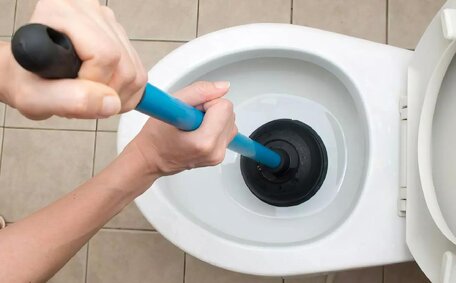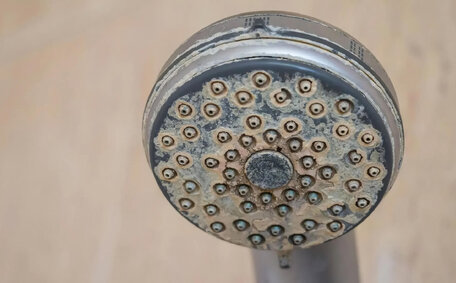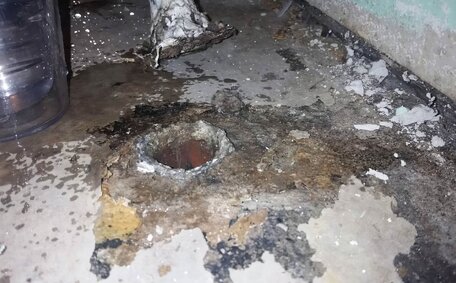Recognizing Blocked Drain Emergencies
Early recognition of blocked drain emergencies is essential to prevent health hazards and property damage. Common signs include water draining slowly from sinks and tubs, foul odours from sewer gases, unexpected water backups, and leaks at pipe joints.
Blocked drains typically begin with a gradual reduction in drainage speed, which may lead to water pooling in sinks or tubs.
As the blockage worsens, water can back up out of floor drains, toilet bowls, and even bubble up through manhole covers outside.
Ignoring slow drainage permits the accumulation of stagnant water and sewer gases, fostering bacterial growth and corrosion while increasing the risk of leaks from water pressure on old pipe joints.
So if you ever perceive foul odours, slowly draining water or overt backups in your plumbing, it likely signals a blocked main sewer line or internal drain pipe. Call a professional emergency plumber right away before conditions can worsen or cause real crisis damage.
Slow Draining Water
Significantly slowed drainage is a clear indication of a blocked drain or sewer line. When sinks, tubs and other fixtures take longer than usual for water to drain, it indicates a partial blockage is forming within the pipes.
This sluggish drainage occurs because debris, grease, tree roots and other gunk is accumulating inside the pipe. As the inner diameter narrows, the flow water becomes restricted and can’t move freely. Over time, drainage goes from fast to slow, eventually backing up entirely if the clog worsens.
Slow drainage leads to stagnant water pooling inside pipes instead of flushing away. This stagnation provides a prime breeding ground for harmful bacteria, which give off noxious sewer gas odours.
Dealing with slow drainage promptly is crucial before conditions can worsen. Partial obstructions left unchecked can evolve into complete pipe blockages. This would necessitate emergency drain cleaning or pipe repairs down the line.
It also risks sewage backups and flooding if pipes burst under excessive internal pressure.
So when you notice sinks, tubs or toilets emptying water slower than usual, contact a professional emergency plumber right away. They can diagnose the cause and clear any forming clogs before serious plumbing damage or backups occur.
Foul Odors
One of the first indicators of a brewing drainage problem is the detection of foul odours emanating from sinks, tub and shower drains. These unpleasant sewer smells are caused by gases emanating from the buildup of debris within pipe interiors.
As organic matter like food scraps, hair, grease and soil accumulate in drain lines over time, bacteria feeds on this stagnant mess. The byproduct is hydrogen sulphide gas which carries a distinct rotten egg odour. Methane gas can also be produced from this stagnant decomposition, creating noxious outhouse-like smells.
If you begin catching whiffs of these unpleasant gases from household plumbing fixtures, it likely means partial or full blockages are forming inside the drainage system. Left unaddressed, these obstructions can worsen over time, leading to more trapped water, intensified odours and potential pipe failures or sewage overflows down the line.
So if you ever notice sewer smells entering your home from sinks, tubs, showers or floor drains, it requires immediate attention. Contact a professional emergency plumber to inspect pipe interiors and clear any developing clogs before hazardous backups can occur.
Backups and Leaks
Backups and leaks are distinct signs that something has gone awry, emphasising why it’s important to meticulously assess the status of your household plumbing system. Blocked drains left unattended can eventually result in hazardous sewage overflows or pipe ruptures.
As obstructions deteriorate within drain lines, high pressure accumulates behind the blockage, making water and waste struggle to go down. Eventually, these systems reach a breaking point - either the excess pressure forces water to back up and overflow from the lowest drain opening, or pipe joints start leaking from the strain.
A main sewer line clog may cause smelly water to bubble up from floor drains or shower drain openings. Or toilets can overflow from their bowls, spilling bacteria-laden sewage onto floors. A particularly badly obstructed kitchen branch line might spring leaks around pipe joints hidden in walls or cabinets.
Exposed sewage carries health risks from infectious bacteria and viruses. And water damage to property can require extensive repairs to flooring, walls and other impacted household systems. Therefore, it’s important to call emergency plumbing specialists immediately at the first signs of drainage backups or leaks to prevent contamination and costly structural issues.
Taking Immediate Action
When facing a blocked drain emergency, the most crucial initial action is to halt any further water entering your drain that’s causing problems. Discontinue using sinks, tubs and showers associated with the clog until it can be properly cleared.
A basic plunger can sometimes provide a quick DIY drain clearance for simple obstructions like hair or loose debris. Cover the drain opening completely with the plunger cup. Fill the basin with a few inches of water, then vigorously plunge up and down at least 15 times to dislodge the clog.
For more entrenched obstructions, a mix of boiling water, baking soda, and vinegar might disintegrate the accumulation, but challenging blockages should be handled by an emergency plumber soon. Carefully dispense a pot of boiling water down drain to target the obstruction. Follow up by pouring 1/2 cup baking soda, then 1 cup vinegar and flush with more hot water.
However, these methods generally only offer temporary relief for minor clogs. The underlying issue will likely resurface unless the full drainage system is professionally inspected and serviced. So contact a trusted emergency plumber even after attempting basic drain clearing steps.
Assessing the Situation
When grappling with drain clogs, pondering what do about the severity is vital to judge if it’s a DIY task or necessitates summoning an emergency plumber.
Small clogs caused by hair, debris, or little grease can often be resolved with a plunger or boiling water treatment. However, if the slow drainage affects multiple fixtures, it likely points to a significant obstruction deeper in the main line, while overflows or backups suggest severe blockages.
Avoid DIY chemical drain cleaners, as they can harm pipes. Instead, attempt a baking soda/vinegar treatment first. If water still drains slowly after several attempts, continue avoiding the drain and call a professional.
Signals indicating the need for emergency plumbing include multiple affected drains, overflows, persistent offensive smells, visible water damage or any other signs of potential pipe collapse. Attempting to dislodge severe clogs yourself with an electric powered auger could worsen damage.
Trust an experienced emergency plumber to accurately diagnose the issue and employ proper equipment to clear it without harming pipes. They can then perform maintenance to prevent future drainage disasters.
Stopping Water Flow
In any blocked drain emergency, your first step should be to stop further water from flowing into the affected pipes. This helps prevent extra water from worsening the obstruction and mitigates further flooding or leakage damage.
Locate the main shut off valve for the home’s water supply and turn the handle clockwise until it stops. This is commonly positioned near the water metre or at the entry of the main water line to the entire home. Turning off the main valve halts water supply throughout your plumbing system.
Also turn off any isolator valves associated with problem drains themselves. Kitchen sinks, some appliances and outdoor hose bibs often have dedicated shut offs. Rotate their handles clockwise to stop water flow.
If leaks, overflows or backups involving still water are already transpiring, ensure you also shut off electricity to compromised zones. Shut down circuit breakers powering appliances or lights around accumulating water on floors. Ensure you don’t touch any electrical equipment while standing in water.
Halting all water and power can help curtail additional flooding damage or electrical short circuit fire hazards until an emergency plumber arrives to fully assess and repair the blockage.
Calling a Professional
Once signs of a serious blockage emerge, it becomes crucial to enlist a professional emergency plumber rather than attempting risky DIY drain repairs.
Emu Plains Plumbing’s team of experts are available 24/7 at 1300 349 338 to accurately assess any blocked drain or sewer emergency. We employ advanced cameras and cutting-edge hydro jet drain cleaning tools to tackle even the most daunting blocked sewer situations.
When calling, be prepared to describe the affected fixtures, locations of backups or leaks, odours noticed, and severity of slow drainage. Photos or videos can also help our technicians diagnose the issue and bring proper gear to remedy it.
We also provide full-scale drain line repairs, replacements or relining if pipes have been damaged. Plus our teams perform preventative drain cleaning maintenance to help avoid future hazardous clogging incidents.
With over 25 years of plumbing services expertise, no drainage issue is too nasty or complex for our techs to tackle. Therefore, if you notice severe blockages, don’t hesitate to contact Emu Plains Plumbing for immediate assistance.
Preventing Future Blockages
Preventing future drain blockages requires developing good household habits and implementing regular maintenance.
It’s important to avoid putting down fats, oils, grease, rice, pasta and hair into sinks or toilets. These are common culprits for adhering to pipe walls and catching passing debris.
Monthly use of baking soda and vinegar can help keep drains clear. Pour 1⁄2 cup baking soda followed by 1 cup vinegar down sinks, then flush with hot water. This helps break up grease and residue.
Install fine mesh drain catchers or screens over all household sinks and tub drains. These strainers collect hair, food scraps and other solids before they enter pipes.
Moreover, arrange for annual professional inspections and cleanings of your main sewer and drain lines. A plumber’s hydro jetting service scours the full pipe interior to flush out stubborn accumulations.
Following these measures will help minimise the risk of experiencing blocked drain emergencies down the line.
Health and Safety Precautions
When dealing with any kind of blocked drain emergency, health and safety should be a top concern due to risks from sewage exposure and electrical shocks.
If water backups or overflows have occurred, wear waterproof boots, gloves and eyewear when cleaning.
Always wash hands immediately after contact.
Keep small children and pets away from affected areas until sanitization is complete. Properly ventilate rooms by opening windows, turning on fans and running dehumidifiers to dry out moisture.
Take care to prevent electrical hazards by keeping all outlets near flooding switched off. Only use battery powered lighting. Never enter a flooded room without first ensuring the power is disconnected.
Exposure to raw sewage can cause bacterial infections, nausea or diarrhoea. Seek medical care if you experience symptoms of illness after contact. Don’t wait for the emergency situation to escalate; call upon a skilled emergency plumber to manage severe blockages instead of trying precarious DIY sewer drain fixes.
Property Damage
Blocked drains left unattended can lead to hazardous flooding and extensive property damage if pipes rupture or waste backups occur. Water leaks can destroy flooring, warp cabinetry, compromise walls, electrical systems and home foundations.
Should a severe sewer line clog clear suddenly, the resulting pressure can burst pipe joints, causing water damage to walls and ceilings. Persistent leaks contribute to mould development, erosion, and ultimately, structural compromise.
Sewage that overflows from fixtures poses significant contamination hazards. Overflowing drainage water harbours bacteria, pathogens and toxins that stain building materials and possessions. Effective cleanup often involves thorough sanitization and may require replacing water-damaged materials.
Sewage damage poses health risks from exposure to diseases and indoor methane gas buildup. Areas affected by waste backup incidents may remain uninhabitable until full professional decontamination and repairs are completed.
Ceasing the use of drains at early clog signs and seeking emergency plumbing aid helps prevent costly damage. Minor blockage clearance is far more affordable than the extensive repairs chronic flooding can necessitate.






